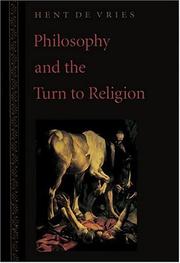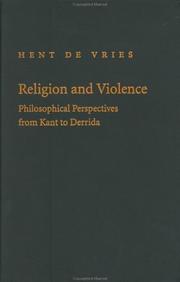| Listing 1 - 10 of 29 | << page >> |
Sort by
|

ISBN: 0801859956 9780801859953 Year: 1999 Publisher: Baltimore (Md.): Johns Hopkins University press,
Abstract | Keywords | Export | Availability | Bookmark
 Loading...
Loading...Choose an application
- Reference Manager
- EndNote
- RefWorks (Direct export to RefWorks)
If religion once seemed to have played out its role in the intellectual and political history of Western secular modernity, it has now returned with a vengeance. In this engaging study, Hent de Vries argues that a turn to religion discernible in recent philosophy anticipates and accompanies this development in the contemporary world. Though the book reaches back to Immanuel Kant, Martin Heidegger, and earlier, it takes its inspiration from the tradition of French phenomenology, notably Emmanuel Levinas, Jean-Luc Marion, and, especially, Jacques Derrida. Tracing how Derrida probes the discourse on religion, its metaphysical presuppositions, and its transformations, de Vries shows how this author consistently foregrounds the unexpected alliances between a radical interrogation of the history of Western philosophy and the religious inheritance from which that philosophy has increasingly sought to set itself apart. De Vries goes beyond formal analogies between the textual practices of deconstruction and so-called negative theology to address the necessity for a philosophical thinking that situates itself at once close to and at the farthest remove from traditional manifestations of the religious and the theological. This paradox is captured in the phrase adieu ( a dieu), borrowed from Levinas, which signals at once a turn toward and a leave-taking from God-and which also gestures toward and departs from the other of this divine other, the possibility of radical evil. Only by confronting such uncanny and difficult figures, de Vries claims, can one begin to think and act upon the ethical and political imperatives of our day.
Natural theology --- Metaphysics --- 21*01 --- 141.4 --- Godsdienstfilosofie: christelijke religie: filosofisch en rationeel --- Stelsels met betrekking tot het standpunt van het godsprobleem --- 141.4 Stelsels met betrekking tot het standpunt van het godsprobleem --- 21*01 Godsdienstfilosofie: christelijke religie: filosofisch en rationeel --- Philosophy and religion --- History --- Philosophy and religion - History

ISBN: 0801867673 0801867681 0801875234 9780801875236 9780801867675 9780801867682 Year: 2002 Publisher: London : Johns Hopkins University Press,
Abstract | Keywords | Export | Availability | Bookmark
 Loading...
Loading...Choose an application
- Reference Manager
- EndNote
- RefWorks (Direct export to RefWorks)
Filosofie en godsdienst --- Godsdienst en filosofie --- Philosophie et religion --- Philosophy and religion --- Religion and philosophy --- Religion et philosophie --- Religious studies --- Violence --- Religious aspects --- Philosophy and religion. --- Religious aspects. --- Violence (in religion, folklore, etc.) --- Christianity and philosophy --- Religion --- Moral and religious aspects --- Violence - Religious aspects
Book
ISBN: 1421437392 1421437414 1421437406 Year: 2019 Publisher: Johns Hopkins University Press
Abstract | Keywords | Export | Availability | Bookmark
 Loading...
Loading...Choose an application
- Reference Manager
- EndNote
- RefWorks (Direct export to RefWorks)
Originally published in 1999. If religion once seemed to have played out its role in the intellectual and political history of Western secular modernity, it has now returned with a vengeance. In Philosophy and the Turn to Religion, Hent de Vries argues that a turn to religion discernible in recent philosophy anticipates and accompanies this development in the contemporary world. Though the book reaches back to Immanuel Kant, Martin Heidegger, and earlier, it takes its inspiration from the tradition of French phenomenology, notably Emmanuel Levinas, Jean-Luc Marion, and, especially, Jacques Derrida. Tracing how Derrida probes the discourse on religion, its metaphysical presuppositions, and its transformations, de Vries shows how this author consistently foregrounds the unexpected alliances between a radical interrogation of the history of Western philosophy and the religious inheritance from which that philosophy has increasingly sought to set itself apart.De Vries goes beyond formal analogies between the textual practices of deconstruction and so-called negative theology to address the necessity for a philosophical thinking that situates itself at once close to and at the farthest remove from traditional manifestations of the religious and the theological. This paradox is captured in the phrase adieu (à dieu), borrowed from Levinas, which signals at once a turn toward and a leave-taking from God—and which also gestures toward and departs from the other of this divine other, the possibility of radical evil. Only by confronting such uncanny and difficult figures, de Vries claims, can one begin to think and act upon the ethical and political imperatives of our day.
Religionsphilosophie. --- Godsdienst. --- Filosofie. --- Philosophy and religion. --- Philosophie et religion --- Philosophy and religion --- Histoire. --- History. --- Christianity and philosophy --- Religion and philosophy --- Religion --- Philosophy of religion
Book
ISBN: 1421437481 1421437503 142143749X Year: 2019 Publisher: Johns Hopkins University Press
Abstract | Keywords | Export | Availability | Bookmark
 Loading...
Loading...Choose an application
- Reference Manager
- EndNote
- RefWorks (Direct export to RefWorks)
What, at this historical moment "after Auschwitz," still remains of the questions traditionally asked by theology? What now is theology's minimal degree? This magisterial study, the first extended comparison of the writings of Theodor W. Adorno and Emmanuel Levinas, explores remnants and echoes of religious forms in these thinkers' critiques of secular reason, finding in the work of both a "theology in pianissimo" constituted by the trace of a transcendent other. The author analyzes, systematizes, and formalizes this idea of an other of reason. In addition, he frames these thinkers' innovative projects within the arguments of such intellectual heirs as J?rgen Habermas and Jacques Derrida, defending their work against later accusations of "performative contradiction" (by Habermas) or "empiricism" (by Derrida) and in the process casting important new light on those later writers as well. Attentive to rhetorical and rational features of Adorno's and Levinas's texts, his investigations of the concepts of history, subjectivity, and language in their writings provide a radical interpretation of their paradoxical modes of thought and reveal remarkable and hitherto unsuspected parallels between their philosophical methods, parallels that amount to a plausible way of overcoming certain impasses in contemporary philosophical thinking. In Adorno, this takes the form of a dialectical critique of dialectics in Levinas, that of a phenomenological critique of phenomenology, each of which sheds new light on ancient and modern questions of metaphysics, ethics, and aesthetics. For the English-language publication, the author has extensively revised and updated the prize-winning German version.
Godsdienstfilosofie. --- Deconstructie. --- Dialectiek. --- Rationalisme. --- Transcendence (Philosophy) --- Rationalism. --- Philosophical theology. --- Dialectic. --- Deconstruction. --- L©evinas, Emmanuel --- Adorno, Theodor W., --- L©evinas, Emmanuel. --- Theology, Philosophical --- Philosophy and religion --- Theology, Doctrinal --- Knowledge, Theory of --- Religion --- Belief and doubt --- Deism --- Free thought --- Realism --- Criticism --- Semiotics and literature --- Polarity --- Polarity (Philosophy) --- Philosophy --- Phenomenology & Existentialism
Book
Year: 2008 Publisher: New York: Fordham university press,
Abstract | Keywords | Export | Availability | Bookmark
 Loading...
Loading...Choose an application
- Reference Manager
- EndNote
- RefWorks (Direct export to RefWorks)
Book
ISBN: 9782350881560 2350881563 Year: 2019 Publisher: Paris: Encre marine,
Abstract | Keywords | Export | Availability | Bookmark
 Loading...
Loading...Choose an application
- Reference Manager
- EndNote
- RefWorks (Direct export to RefWorks)
Est-ce que des miracles se produisent encore ? S’en est-il jamais produit, à strictement parler ? Qu’est-ce qui dans le passé les a rendus possibles, sinon nécessaires, et qu’en est-il maintenant ? La notion de miracle et les multiples manières dont la croyance au miracle a été conceptualisée peuvent nous aider à mieux comprendre deux phénomènes contemporains. Premièrement, elles aident à comprendre les rapports de plus en plus complexes entre, d’une part, les véritables événements de la vie quotidienne – qu’elle soit privée, publique ou politique – et, d’autre part, ceux qui relèvent du domaine de l’artificiel et du calculé, technologique et médiatique. Deuxièmement, elles permettent de saisir le lien structural entre les irruptions de la religion dans l’espace public mondialisé et les nouvelles technologies de la communication
Book
ISBN: 9782130815105 2130815103 Year: 2019 Publisher: Paris: PUF,
Abstract | Keywords | Export | Availability | Bookmark
 Loading...
Loading...Choose an application
- Reference Manager
- EndNote
- RefWorks (Direct export to RefWorks)
Le miracle est un événement qui semble excéder ses causes. Frappant, imprévu, il remet en question les limites de ce qui est censé être possible. Mais n’est-ce pas ce qui caractérise les événements authentiques, dans les domaines historiques et politiques, éthiques et artistiques, dans les vies et les amours individuelles ? En quel sens pouvons-nous dire que les miracles, et plus précisément la pensée du miracle, peuvent constituer une ressource conceptuelle et une richesse sur le plan pratique, permettant de répondre à cette question résolument philosophique ? Comment penser le miracle en tenant compte des critiques anciennes et modernes ? De saint Augustin à Wittgenstein, la question n’a cessé d’être brûlante pour les philosophes. Dans une série de « méditations métaphysiques », Hent de Vries explore le concept de miracle et la croyance au miracle. Porté par une démarche philosophique ouverte, il convie à l’étude d’une métaphysique des miracles et du miracle de la métaphysique, fondés sur l’étonnement et l’émerveillement.
Metaphysics. --- Miracles (surnaturel). --- Miracles. --- Métaphysique. --- metaphysics. --- miracles.
Article
Abstract | Keywords | Export | Availability | Bookmark
 Loading...
Loading...Choose an application
- Reference Manager
- EndNote
- RefWorks (Direct export to RefWorks)
Article
Abstract | Keywords | Export | Availability | Bookmark
 Loading...
Loading...Choose an application
- Reference Manager
- EndNote
- RefWorks (Direct export to RefWorks)
Article
Abstract | Keywords | Export | Availability | Bookmark
 Loading...
Loading...Choose an application
- Reference Manager
- EndNote
- RefWorks (Direct export to RefWorks)
| Listing 1 - 10 of 29 | << page >> |
Sort by
|

 Search
Search Feedback
Feedback About UniCat
About UniCat  Help
Help News
News